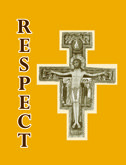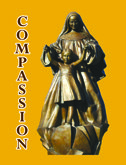As a member of the Association of Franciscan Colleges and Universities USF holds certain characteristic of Franciscan higher education and give witness to the following common attributes…
1) The Franciscan Tradition holds a sacramental view of the world and of the human person as a reflection of God’s overflowing goodness. Thus, a Franciscan education:
2) The Franciscan Tradition emphasizes relationships building communion from a stance of minoritas. Thus, a Franciscan education:
3) The Franciscan Tradition, balancing both orthodoxy and orthopraxy, is grounded in Gospel values. Thus, a Franciscan education:
The Franciscan Tradition has a distinctive approach to reality. As an educational institution these characteristics shape and define policies, practices, activities, interactions, programs, speakers, celebrations, prayer opportunities, service projects, course offerings, professional preparation, resolution of conflicts, orientations, and other interactions.
USF is first and foremost a community, because community is fundamental to the Catholic Gospel tradition. In the language of our Franciscan Tradition, we call it fraternitas, united through the salvific action of our brother Jesus. We are all children connected by “our Father.”

WE ARE A COMMUNITY OF RESPECT
We hold reverence for all life and all humankind as children of God, we are brothers and sisters to all peoples—races and beliefs. We strive to show a reverence for all human life and life of all forms. Dignity and respect for all drive our efforts in working for the common good. In the spirit of charity, we support each other. We live daily with a reverence for all creation.

WE ARE A COMMUNITY OF COMPASSION
We have compassion for all people, always aware of the call to love our neighbors as ourselves, we strive to open our hearts to all others. We seek to form loving relationships thereby promoting empathy, forgiveness and peace in the global community. We work to build up God’s people everywhere, to bring reconciliation, and to act as instruments of change for future generations.

WE ARE A COMMUNITY OF SERVICE
In the Spirit of St. Francis, we strive to serve all people, especially the poor and powerless. Knowing our own dependence on God and on others, we engage in active service to the poor and to those with special needs. In order to accomplish our mission, we seek also to exercise a wise stewardship of the university’s resources.

WE ARE A COMMUNITY OF INTEGRITY
In our work and interaction, we commit ourselves in honesty and excellence in our work, and seek to experience high ethical standards in our lives. We accept personal responsibility for our actions. We are well aware of concern for the challenges of Christian living in a modern world. The university attempts to assist students, faculty and business people to achieve greater understanding of ethical dimensions of professional life.
This prayer is associated with St. Francis of Assisi
Lord, make me an instrument of Thy peace;
where there is hatred let me sow love;
where there is injury, pardon;
where there is doubt, faith;
where there is despair, hope;
where there is darkness, light;
and where there is sadness, joy.
O Divine Master,
grant that I may not so much seek to be consoled, as to console;
to be understood, as to understand;
to be loved, as to love;
for it is in giving that we receive,
it is in pardoning that we are pardoned,
and it is in dying that we are born to eternal life.
-St. Francis of Assisi
